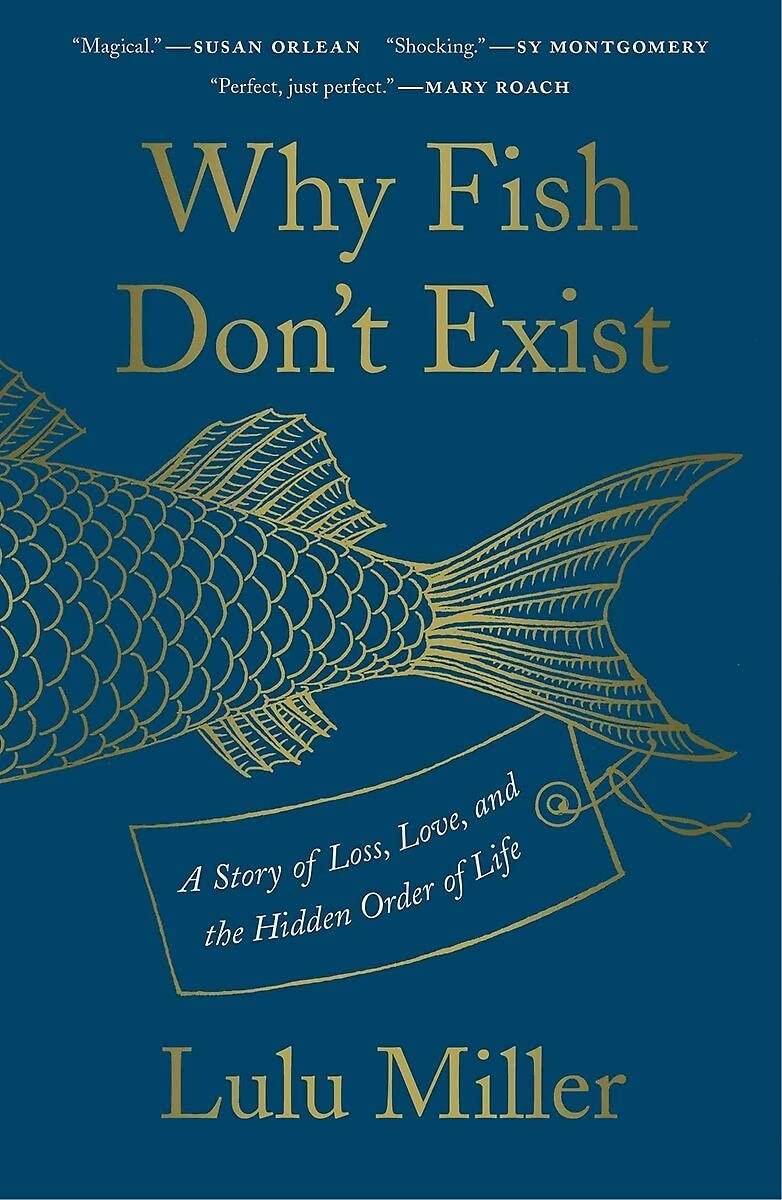Explore web search results related to this domain and discover relevant information.
For many fishes, overfishing remains a pressing global problem for which appropriate solutions are not easily found nor implemented. Instructors, if you are reviewing or adopting for use in a class, please let us know. https://bit.ly/fishandconservation_interest For PDF, ePub, recordings of ...
Compare and contrast the importance of commercial, recreational, and subsistence fishing. Describe why fish matter to humans.Fish live on every continent and in all types of aquatic environments. Think about a fish that you are most familiar with. Its value to you depends on if, how, and where you interact with the fish. The essence of this fish depends on your perspectives.Imagine you are sitting in a meeting of the Alaska Board of Fisheries, which conserves and develops the state’s fishery resources. Before the formal meeting you would hear commercial gillnetters speak of their concerns about season lengths and quotas. Outfitters and local tourism officials are concerned about crowding during sportfishing seasons and what locals call combat fishing because of anglers competing to find and protect fishing spots.Ultimately, because fish inhabit diverse environments and serve many important ecological and anthropogenic services, fish conservation and management issues come down to our value systems. Goals for conservation are derived by asking “What should we care about?” Personally, I believe that fish conservation should be to ensure that fish persist so that future generations may decide on how they will interact with these fascinating animals.
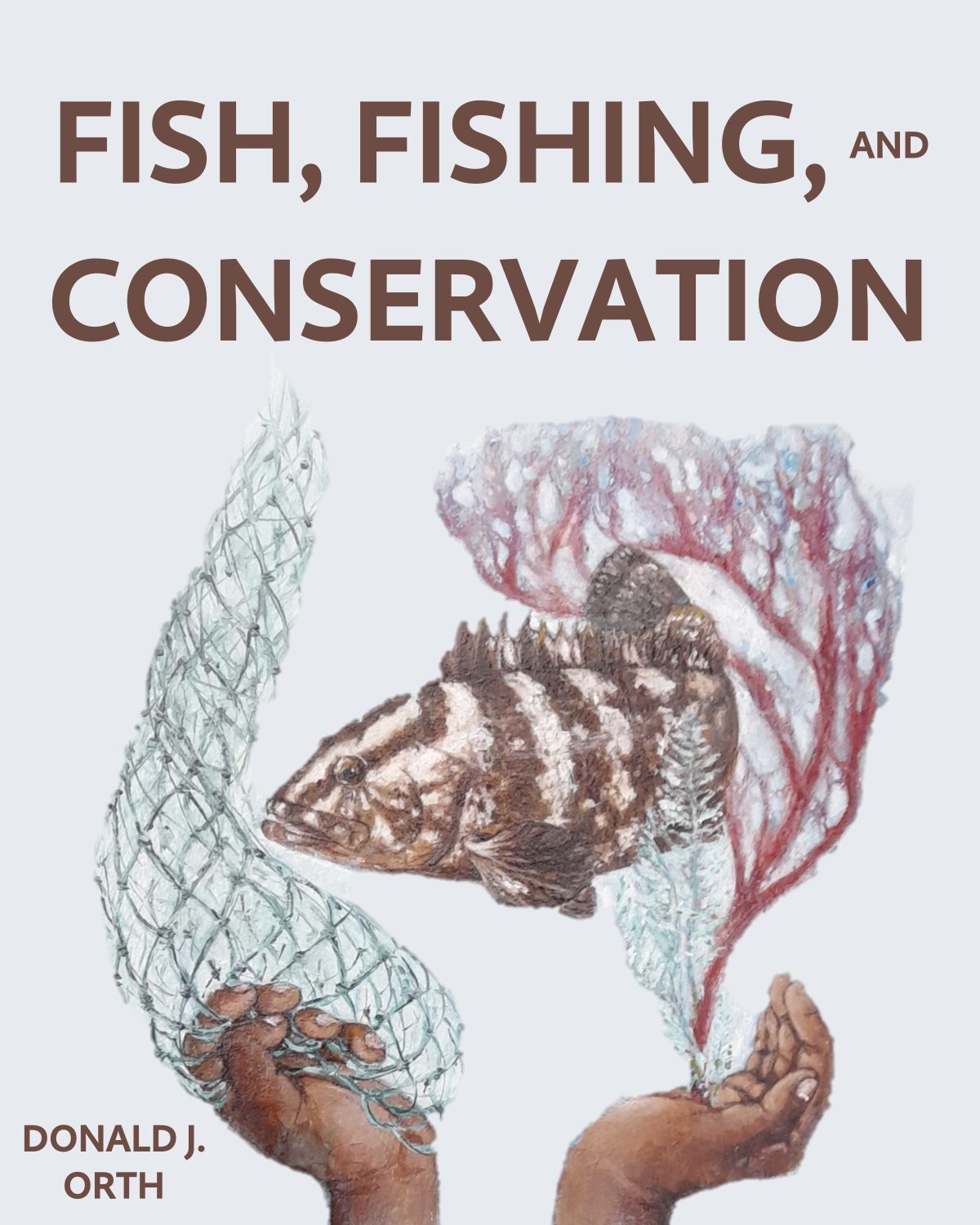
Buy Why Fish Don't Exist: A Story of Loss, Love, and the Hidden Order of Life on Amazon.com ✓ FREE SHIPPING on qualified orders
A Best Book of 2020: The Washington Post * NPR * Chicago Tribune * Smithsonian A “remarkable” (Los Angeles Times), “seductive” (The Wall Street Journal) debut from the new cohost of Radiolab, Why Fish Don’t Exist is a dark and astonishing tale of love, chaos, scientific obsession, and—possibly—even murder. “At one point, Miller dives into the ocean into a school of fish…comes up for air, and realizes she’s in love.In time, he would be credited with discovering nearly a fifth of the fish known to humans in his day. But the more of the hidden blueprint of life he uncovered, the harder the universe seemed to try to thwart him. His specimen collections were demolished by lightning, by fire, and eventually by the 1906 San Francisco earthquake—which sent more than a thousand discoveries, housed in fragile glass jars, plummeting to the floor.He surveyed the wreckage at his feet, found the first fish that he recognized, and confidently began to rebuild his collection. And this time, he introduced one clever innovation that he believed would at last protect his work against the chaos of the world. When NPR reporter Lulu Miller first heard this anecdote in passing, she took Jordan for a fool—a cautionary tale in hubris, or denial.What she would unearth about his life would transform her understanding of history, morality, and the world beneath her feet. Part biography, part memoir, part scientific adventure, Why Fish Don’t Exist is a wondrous fable about how to persevere in a world where chaos will always prevail.

The plural of fish is usually fish. When referring to more than one species of fish, especially in a scientific context, you can use fishes as the plural.
The zodiac sign Pisces is also often referred to as fishes. Here’s a tip: Want to make sure your writing shines? Grammarly can check your spelling and save you from grammar and punctuation mistakes. It even proofreads your text, so your work is extra polished wherever you write.One of the most memorable quotes from the movie The Godfather is: “It’s a Sicilian message. It means Luca Brasi sleeps with the fishes.” In Mario Puzo’s novel The Godfather, which is the basis for the movie, that line is a bit different: “The fish means that Luca Brasi is sleeping on the bottom of the ocean,” he said.If you, for example, see two trout swimming together, you could say that you’re looking at fish. However, if the two trout were joined by a salmon, you could describe them as fish or fishes. Fish can refer to multiple fish, especially when they are all the same species of fish.You can also say that someone fishes as a hobby, but that’s just a form of the verb “to fish.” Finally, there’s the saying “if fishes were wishes, we’d all cast nets,” which is commonly attributed to Frank Herbert, author of the Dune series.
A longtime angler says the benefits of the sport are sometimes surprising.
I am locked into the hunt, the presentation and the expectation that at any moment I’m going to be battling the biggest fish of my life. This single-minded focus alters the normal passage of time. When the fishing is good, time passes by at warp speed and when it’s slow time crawls, but I’m still concentrating on how to find the fish.More importantly, at least for me anyway, fishing is one of the few pastimes where I’m in the moment, and no outside thoughts enter my head. I’m either thinking about how we can catch more fish or trying to figure out why we aren’t catching any. Every time my lure comes back to the boat, my brain is considering the next cast.Sure, I could buy a fish at the grocery store for far less money and in far less time than I can prowling the ocean. But that feeling of accomplishment wouldn’t be there. Even though an angler like me spends a ton of money on the sport, when I bring a fish home for dinner, I have it in my head I found it and caught it for free, and therefore I’m a wonderful provider.And don’t even try to make the comparison between fishing and golf. Okay, both involve swearing, but I’ve never seen a fisherman toss a rod in frustration, yet how many times have you seen a golfer throw a club to the ground? I’ll bet the answer is “many times.” Which means you have watched me attempt to golf.
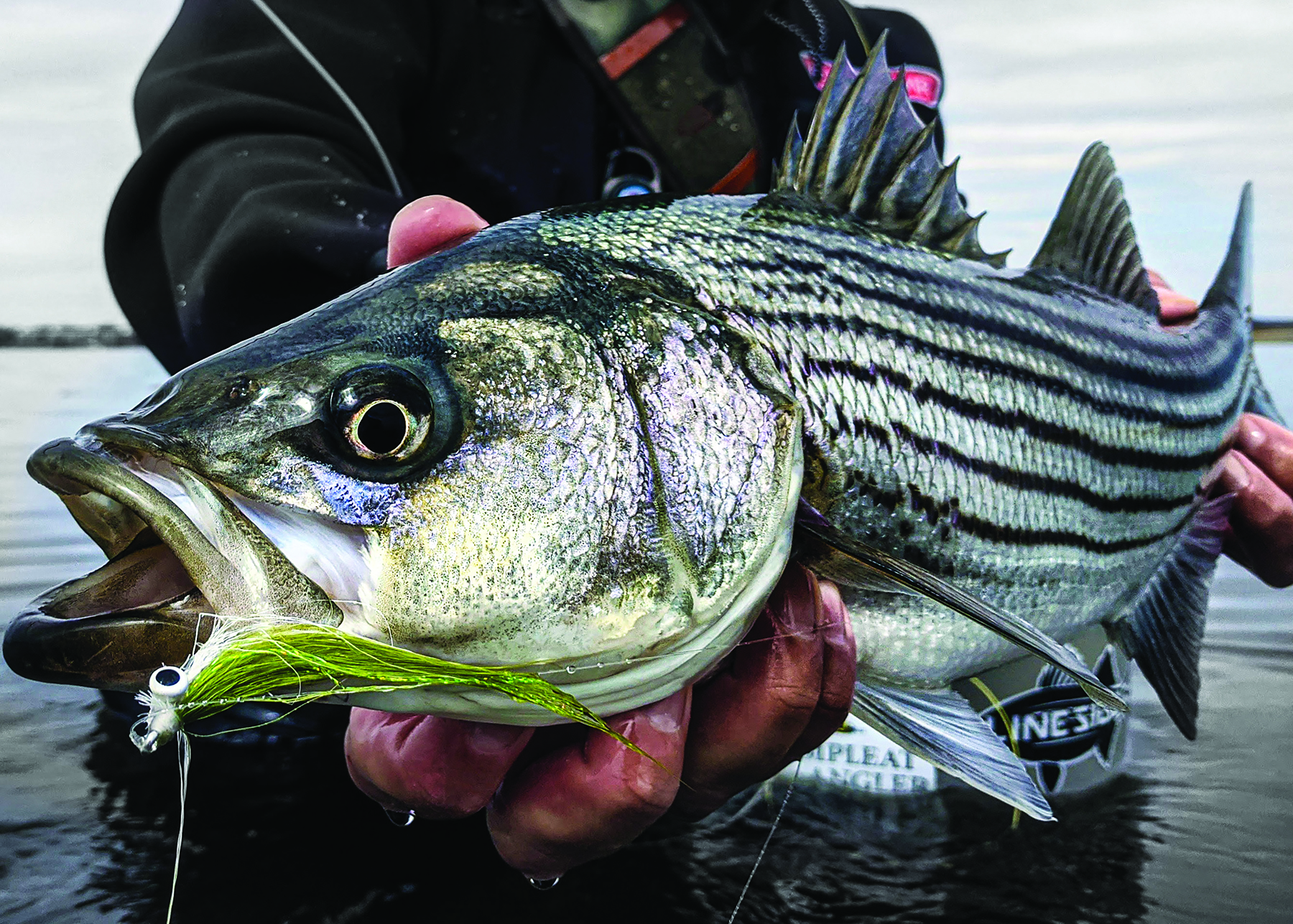
Fish is an important source of high-quality protein, essential fatty acids (especially omega-3 fatty acid), vitamins, and minerals, making it vital for maintaining overall health, supporting brain function, cardiovascular health, and promoting growth and development, while also contributing ...
Fish is an important source of high-quality protein, essential fatty acids (especially omega-3 fatty acid), vitamins, and minerals, making it vital for maintaining overall health, supporting brain function, cardiovascular health, and promoting growth and development, while also contributing to the prevention of chronic diseases such as heart disease, diabetes, and cognitive decline.Major common contaminants in fish include selenium, polycyclic aromatic hydrocarbons (PAHs), polychlorinated biphenyls (PCBs), cadmium, arsenic, Methyl mercury, lead, dioxins, and chlorinated hydrocarbon pesticides. Generally, these contaminants enter the fish's body through the gills or skin. When consumed in large amounts, these contaminants build up in fish tissues and badly affect human health (16).The article offers effective therapeutic potential to reduce diseases in a community and worldwide. The main aim of this review article is to focus on the nutritional value of fish, its bioactive compounds, fish-based by-products, and their therapeutic potential, while also addressing their role in managing and eradicating public health-related diseases.Several essential nutrients, such as vitamin D, omega-3 fatty acids, selenium, potassium, and many other essential nutritional components, help to improve overall wellbeing as mentioned in Table 2. Few fish species, including shark, king mackerel, and swordfish, exert harmful effects on human health due to toxic contaminants present in these fish. The primary harmful fish contaminants are methylmercury, persistent organic pollutants, PCBs, and dioxins, which cause negative effects on human health.
Science has proven that fish feel pain, yet they are exploited...
Farmed fish are confined in overcrowded ponds, or in underwater cages in natural bodies of water. Farmed fish are genetically selected to grow much faster than their wild counterparts, which weakens their immune systems and makes them susceptible to health problems including deafness and bent spines.Sportfishing Every year in the U.S., over 300 million fish are captured by recreational fishermen. After being dragged to the surface, fish suffocate when they are removed from the water. They also sustain severe injuries from the hooks that pierce their mouths and bodies.The Pet Trade The commercial capture, breeding, and selling of fish as pets are rife with brutality. Most saltwater fish are caught from the wild where they are often stunned with explosions. Freshwater fish are mass bred in the underwater equivalent of puppy mills.Fish sold as pets frequently die from improper care and neglect following purchase. Fish are not covered by animal cruelty laws in many states. Even where they are, abuse and neglect of pet fish are rampant, conditions are seldom reported, and abusers are rarely pursued by law enforcement.
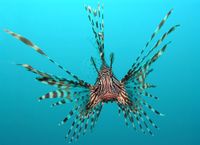
A fish is any member of a paraphyletic group of organisms that consist of all gill-bearing aquatic craniate animals that lack limbs with digits. The word "fish" comes from Middle English fisch which comes from Old English fisc which is descended from Proto-Germanic *fiskaz which is ultimately ...
A fish is any member of a paraphyletic group of organisms that consist of all gill-bearing aquatic craniate animals that lack limbs with digits. The word "fish" comes from Middle English fisch which comes from Old English fisc which is descended from Proto-Germanic *fiskaz which is ultimately from Proto-Indo-European *peysḱ- meaning "fish".Most fish are ectothermic ("cold-blooded"), allowing their body temperatures to vary as ambient temperatures change, though some of the large active swimmers like white shark and tuna can hold a higher core temperature.[1][2] Fish are abundant in most bodies of water.Because the term "fish" is defined negatively, and excludes the tetrapods(i.e., the amphibians, reptiles, birds, and mammals) which descend from within the same ancestry, it is paraphyletic, and is not considered a proper grouping in systematic biology.The earliest organisms that can be classified as fish were soft-bodied chordates that first appeared during the Cambrian period. Although they lacked a true spine, they possessed notochords which allowed them to be more agile than their invertebrate counterparts.
Our reasons to love fish includes it can help you live longer, it’s chock full of nutrients, can make you feel happy, and it’s so easy to prepare.
There are tuna poke bowls to devour, as well as vibrant fish curries and chowders, blackened redfish, fish and chips, and so many more wonderful options. No matter what you order or buy, or how you like it prepared, fish truly is one of the most delicious and satisfying foods you could ever pile on your plate.In addition to omega-3s, "fish also provides an excellent source of vitamin D," Ehsani adds. “Many Americans can end up running quite low in vitamin D, especially during the winter months — this is when seasonal affective disorder (SAD) becomes an issue. Being low in this 'sunshine vitamin' can increase your likelihood of depression.In what's called a “meta-analysis," wherein researchers compare the results of a number of different previously published studies, Chinese researchers reviewed data analyzing the health and diets of more than 120,000 people. In doing so, they found a distinct link between fish consumption and a lower incidence of various vision illnesses.If mega doses of vitamins and minerals and stronger hearts, brains, eyes, and more aren't reason enough to consider loading your shopping cart with fresh, frozen, or canned fish, consider this: Eating fish regularly is also connected to significant gains in longevity overall. In a 16-year study of more than 240,000 men and 180,00 women published in 2018 in the Journal of Internal Medicine, researchers reported that individuals who ate fish the most often were significantly less likely to die during the course of the study than those who ate it the least frequently.


Seafood is a delicious meal option and provides plenty of protein and vitamins as well as many health benefits. Fish is also part of healthy eating plans such as the Mediterranean diet, which has been shown to support heart health.
Yes, adding baked, pan-seared, steamed, air-fried or grilled fish to your meal provides you with lots of nutrition benefits. These nutrients include: Protein for healthy muscles, organs and blood vessels · Vitamin D, which helps balance calcium levels to maintain bones and teethUnlike trans or saturated fat (which can be found in processed foods and red meat), the fat in fish is great for your health, because it is rich in omega-3 fatty acids. Omega-3 fatty acid is an essential fat that cannot be made by the body and must be supplied by the food you eat.Fish oil capsules are available, but taking them does not provide some of the other benefits of eating fish, such as protein, iron and other B vitamins. “As a dietitian, I always like to encourage people to eat their nutrients in the form of whole foods, rather than pills and supplements, to get the most benefit,” she says.Mercury is also a concern, because excess mercury consumed while pregnant and/or nursing can increase the baby’s risk of developing brain and nervous system damage, birth defects, or hearing and vision problems. “It is suggested that pregnant and breastfeeding people limit fish to two to three servings per week or 8–12 ounces per week, even when properly cooked, and opt for fish that are lower in mercury.”

Nature Therapy — Passion Why You Should Fish A bright spot in hard times, a reason to explore, passion, connection, friendship… A Bright Spot on a Day of Gloom April 22, 1990 Siblings laugh and …
Siblings laugh and play at the edge of a pond you are fishing. You cast a top water lure and cry because you’ll never laugh with your brother again. Earlier in the day, you had your hand on him as he took his last breaths. He was only 20, and you are 17. You cast again, buzzing the lure along a weed edge, and a bass crushes it.A smile pauses the devastation. Fishing gives you a bright spot on this day of gloom.You’re eight years old, fishing for the first time. Small panfish come easy. You want a Big One, so you put on an extra-large worm and set your bobber deeper.
162 votes, 30 comments. by Lulu Miller I got this book from the annual book swap that my bookclub does. I *inhaled* this book during a flight last…
The book traces the life and career of David Starr Jordan, a scientist credited with discovering over 2,000 of the species of fish we know today. The book isn't too science heavy, the narrator weaves in glimpses into her personal life, and overall the storytelling is gorgeous.Even if you don't like science, or fish, I would still *highly* recommend checking this book out!Posted by u/_knotty_ - 162 votes and 30 commentsI just finished it today. It was really impactful. It touched on a lot of existential conflicts that I've had in mind lately in really wonderful ways. The author keeps it so very real. The bits on dandelions, Kafka, and the whole epilogue were especially impactful.

Our first limited-edition broadside! Hand-set letterpress and hand-colored intaglio by Jerry Dennis and Glenn Wolff, in a signed, remarqued, and numbered edition of 50, printed on BFK Rives 250-gram paper. Sheet size 11 x 15 inches. Sign up to be the first to know when the next print is going ...
Our first limited-edition broadside! Hand-set letterpress and hand-colored intaglio by Jerry Dennis and Glenn Wolff, in a signed, remarqued, and numbered edition of 50, printed on BFK Rives 250-gram paper. Sheet size 11 x 15 inches. Sign up to be the first to know when the next print is going to be released
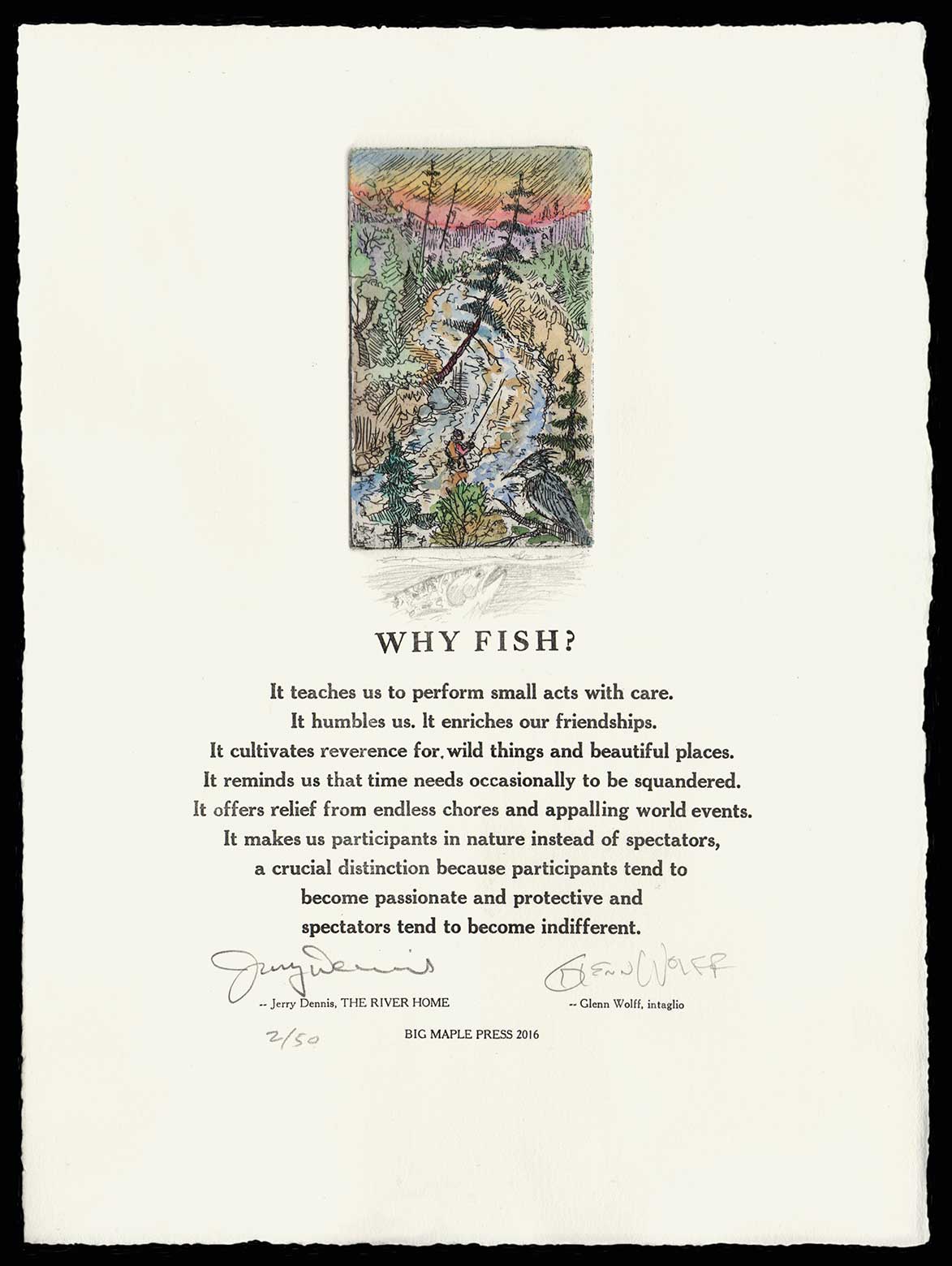

Experts also advise that pregnant people avoid raw and uncooked fish due to the increased risk of severe food poisoning as pregnancy is an immunocompromised state. Severe food poisoning can harm both the fetus and pregnant parent. Your brain function often declines with aging. While mild mental ...
Experts also advise that pregnant people avoid raw and uncooked fish due to the increased risk of severe food poisoning as pregnancy is an immunocompromised state. Severe food poisoning can harm both the fetus and pregnant parent. Your brain function often declines with aging. While mild mental decline is normal, neurodegenerative ailments such as Alzheimer’s disease also exist.Fish and fish products are among the best dietary sources of vitamin D. Fatty fish like salmon and herring contain the highest amounts. A single 4-ounce (113-gram) serving of cooked salmon contains 127% of the recommended intake of vitamin D for adults younger than 70 years, and 95% of the recommended intake for adults older than 70 years. ... cod liver oil, are also very high in vitamin D, which provides 170% of the Daily Value (DV) in a single tablespoon (15 mL).Fish is a wonderful source of high quality protein. Fatty species also pack heart-healthy omega-3 fatty acids. What’s more, it has numerous benefits, including vision protection and improved mental health.Raw fish is highly nutritious but there are some risks, especially for pregnant women.READ MORE ... This is a detailed review of the Nordic diet. Foods to eat, foods to avoid, health benefits and a review of the research behind the diet.READ MORE · Wild vs. Farmed Salmon: Which Type of Salmon Is Healthier?

Fish can benefit every part of you – from your head to your toes – and with a wide range of types, tastes and textures, it can bring variety and novelty to your meals. Just don’t microwave the leftovers at the office. Below, we’ll explain why and how eating fish regularly is important ...
Fish can benefit every part of you – from your head to your toes – and with a wide range of types, tastes and textures, it can bring variety and novelty to your meals. Just don’t microwave the leftovers at the office. Below, we’ll explain why and how eating fish regularly is important for you and your family.Once they’re born, babies receive DHA and other essential nutrients for growth from breast milk, as long as their mothers continue to eat fish. Studies show children benefit developmentally in this way when their moms eat about 2-3 servings of fish per week during pregnancy and while breastfeeding (with a serving being a four-ounce portion).However, the mercury found in some fish can be harmful to moms and growing babies. Check out our blog on eating fish while pregnant for tips on how to safely include fish in your pregnancy and postpartum diet.Fish packs a double punch when it comes to helping you sleep well. The omega-3s and vitamin D in fish help regulate the level of serotonin in our brains, and serotonin contributes to high-quality sleep. That’s because serotonin triggers the production of melatonin, the sleep hormone that helps you fall asleep and stay asleep.
Eating fish is an important source of omega-3 fatty acids. These essential nutrients keep our heart and brain healthy. Two omega-3 fatty acids found in fish are EPA (eicosapentaenoic acid) and DHA (docosahexaenoic acid). Our bodies don't produce omega-3 fatty acids so we must get them through ...
Fish is a low-fat high quality protein. Fish is filled with omega-3 fatty acids and vitamins such as D and B2 (riboflavin). Fish is rich in calcium and phosphorus and a great source of minerals, such as iron, zinc, iodine, magnesium, and potassium. The American Heart Association recommends eating fish at least two times per week as part of a healthy diet.Eating fish is an important source of omega-3 fatty acids. These essential nutrients keep our heart and brain healthy. Two omega-3 fatty acids found in fish are EPA (eicosapentaenoic acid) and DHA (docosahexaenoic acid). Our bodies don't produce omega-3 fatty acids so we must get them through the food we eat.Fish is an important cultural icon in Washington State that defines a recreational as well as a spiritual way of life in the Pacific Northwest. Fish is not only an important source of nutrition, the act of catching, preparing, and eating fish are important cultural and family practices as well.Fish is packed with protein, vitamins, and nutrients that can lower blood pressure and help reduce the risk of a heart attack or stroke.
Why Fish? We are the premier IP law firm and the most innovative companies in the world rely on us to handle their technically sophisticated matters.
We’re ready to hit the ground running to support your innovations, while distilling our vast technical and legal knowledge to resonate with business leaders or juries. You can be confident in every Fish lawyer in your corner because we intentionally build talent from the ground up and share knowledge generously and eagerly across the firm, leading to faster, fuller insights for you.You can feel confident in every Fish attorney, because we grow outstanding IP lawyers from the ground up. We carefully pass our decades of industry-leading IP knowledge to our next-gen lawyers by giving them early opportunities to excel – that’s why our mid-level associates often have more in-the-ring experience than partners at other firms.Learn how our robust pro bono practice strengthens our bond to the communities in which we live and work, informs our practice, and allows those of limited means to access justice. Fish’s world-class legal operations experts bring business sensibility to the firm’s engagements.At Fish, we are laser-focused on the practice of intellectual property law.


There are tuna poke bowls to devour, as well as vibrant fish curries and chowders, blackened redfish, fish and chips, and so many more wonderful options. No matter what you order or buy, or how you like it prepared, fish truly is one of the most delicious and satisfying foods you could ever ...
There are tuna poke bowls to devour, as well as vibrant fish curries and chowders, blackened redfish, fish and chips, and so many more wonderful options. No matter what you order or buy, or how you like it prepared, fish truly is one of the most delicious and satisfying foods you could ever pile on your plate.In addition to omega-3s, "fish also provides an excellent source of vitamin D," Ehsani adds. “Many Americans can end up running quite low in vitamin D, especially during the winter months — this is when seasonal affective disorder (SAD) becomes an issue. Being low in this 'sunshine vitamin' can increase your likelihood of depression.In what's called a “meta-analysis," wherein researchers compare the results of a number of different previously published studies, Chinese researchers reviewed data analyzing the health and diets of more than 120,000 people. In doing so, they found a distinct link between fish consumption and a lower incidence of various vision illnesses.If mega doses of vitamins and minerals and stronger hearts, brains, eyes, and more aren't reason enough to consider loading your shopping cart with fresh, frozen, or canned fish, consider this: Eating fish regularly is also connected to significant gains in longevity overall. In a 16-year study of more than 240,000 men and 180,00 women published in 2018 in the Journal of Internal Medicine, researchers reported that individuals who ate fish the most often were significantly less likely to die during the course of the study than those who ate it the least frequently.

Fish is also rich in iodine, which is a vital mineral that the body can’t produce on its own. Iodine is important to the function of your thyroid, which controls things like your appetite and your immune system.
Depending on the species, fish can have varying levels of nutrients. The most significant difference is fat content: species like salmon and tuna are considered fatty, while cod and catfish are lean. This leads to variation in the calories you can expect.All animals can have parasites or harbor bacteria under the wrong conditions. Getting your fish fresh or thoroughly frozen is the best way to ensure your fish is safe to eat. Sushi, which includes fish that are raw, requires the fish to have been frozen to below 0 degrees Fahrenheit for 24 hours before serving.Fish are a great source of protein, which is critical to maintaining healthy muscles, organs, and blood vessels. Protein helps support cell division, hair growth, and even hormone signaling.While fish itself is typically healthy for you, it’s important to check where the fish you eat was caught. Many ocean-caught fish are high in mercury, which can be toxic in large quantities.

Fishing is relaxing and enjoyable. Read our top four reasons why you should go fishing today, and learn how to stay safe on your fishing boat!
Fishing is a favorite pastime for many people for many reasons. Some find the solitude and quiet of being on a boat or a dock alone with their thoughts (and the fish) relaxing, while others like the competition of fishing for sport.Regardless of why you fish (or why you might be interested in learning to fish), it's an excellent way to spend time outdoors, enhance your safe boating skills, and get out of your daily routine – unless your daily routine is fishing!If it's been a while or you never have, consider four reasons why you should cast your line today! Are you stressed? Jump on a boat and cast a line! There's nothing like hitting the pause button on your hectic life and relaxing in the great outdoors. Spending time in nature can boost your creativity and improve your mental health. So, if you're feeling a bit uninspired, overwhelmed, or stressed, just pack up your rod and reel and take a trip to the lake! Fishing is a great way to get your kids (or even your significant other) to step away from their computer screens and spend quality time together.Kids love fishing and being outdoors. While they might not like touching the worms to put one on a hook, they will enjoy spending time with you on the water and the excitement of feeling a fish on the line and pulling it into the boat.
An account of David Starr Jordan, the pioneering ichthyologist and first president of Stanford University caught up in murder and eugenics.
Jordan devoted his career to cataloguing and classifying the diverse fish species of the American West, amassing what was considered the most comprehensive collection of fish specimens in the world during the late 1800s. Miller uses his life and work to explore how science is constructed through acts of both discovery and denial.When Jordan dismissed theories of evolution and envisioned fish taxonomy to reflect God's intentional design, Miller uses his story to argue that scientific facts do not exist independently of the scientists who work to establish them, as all taxonomy involves ambiguity and selective judgment that reflect the classifiers’ biases.By chronicling Jordan’s contributions yet refusal to acknowledge inconvenient data, Miller examined the complex interplay between discovery and prejudice, crafting a thoughtful study of the human decisions that establish what we accept as objective facts about the natural world. Perhaps even more fascinating was how Jordan’s fragile fish collection was crushed not once but multiple times.Yet, he refused defeat and resurrected his work again and again. It’s tenacity and unwavering dedication on his part, the irony of which further sets us up for the twist at the very end on the book’s punchy title: why fish don’t exist.
